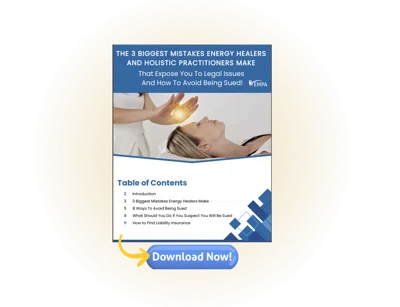5 Client Misunderstandings That Can Ruin a Healing Session
August 30th, 2025
4 min read
By Anya Charles

You put your heart into every healing session, yet every now and then…a client may walk away feeling disappointed or unsure.
We want to offer some reassurance: if this happens, it doesn’t necessarily mean you did anything wrong.
Often the real issue is that clients come in with expectations that you couldn’t have known about. Maybe they thought they’d feel instantly transformed, or assumed your work could replace medical care. Those kinds of misunderstandings can leave both you and your client feeling unsettled.
The encouraging news is that most of these situations can be prevented with clear, compassionate communication.
In fact, at EMPA, we’ve found that many healers make a few simple adjustments for smoother sessions that help clients feel more at ease.
In this article, you’ll learn the 5 most common client misunderstandings—and how to head them off with compassionate communication and professional boundaries.
2-2.png?width=188&height=172&name=Hubspot%20pic%20%20(1)2-2.png) 1. When Clients Expect Instant Relief
1. When Clients Expect Instant Relief
One of the biggest sources of disappointment is when clients walk in hoping for an immediate change. They may think one session will erase years of stress, discomfort, or imbalance. When that doesn’t happen, frustration can set in.
This is why it’s essential to establish roles clearly at the start. Explain that energy healing is a supportive process, and while many people notice shifts, experiences vary and benefits often build gradually over time.
Never promise specific outcomes. Even well-intentioned assurances can backfire if a client feels let down — and worse, they could open the door to a liability claim. Protect yourself and your practice by focusing on what you offer: a safe, professional space that supports your client’s own healing journey.
💡We’ve seen time and again that many unhappy client situations come down to a small number of preventable missteps. That’s why we created our 3 Biggest Mistakes guide — a resource to help you spot risk areas early and protect your practice with confidence.
By addressing expectations from the start, you’ll not only avoid disappointment but also create space for clients to appreciate the subtle progress they’re making.
1-2.png?width=188&height=169&name=Hubspot%20pic%20%20(1)1-2.png) 2. When Clients See You as a Substitute for Medical Care
2. When Clients See You as a Substitute for Medical Care
Another misunderstanding arises when clients confuse energy healing with medical treatment. Some may assume your work takes the place of a doctor’s care, or expect you to “fix” a condition outright. This exposes you to serious professional risk.
Here’s the reality: unless you are a licensed medical professional, you should never use words like treat, cure, diagnose, prevent, or heal. Even an accidental slip of language can be seen as practicing medicine without a license, which carries legal consequences. Even licensed medical providers are cautious with these words for a reason — non-licensed practitioners should be even more so.
Instead, explain that your role is to support well-being and that energy work is a complementary practice, not a replacement for medical care.
💡Curious about what language you can use instead? Check out our article: What You Can and Can’t Say in Your Marketing as an Energy Practitioner. It offers clear, practical guidance to help you avoid risky phrasing while staying true to your practice.
3-1.png?width=250&height=139&name=Hubspot%20pic%20%20(1)3-1.png) 3. When Clients Misunderstand What Energy Healing Is (and Isn’t)
3. When Clients Misunderstand What Energy Healing Is (and Isn’t)
Picture this: a new client arrives expecting a massage, a dramatic breakthrough, or even something a bit “mystical.” Instead, they experience a quiet, subtle session — and suddenly they’re unsure if anything really happened.
These kinds of mismatched perspectives can leave clients confused or questioning the value of the session, even when you’ve given your best.
That’s why a few minutes of clear explanation upfront can make all the difference. Describe what your sessions typically look like, what clients might feel (or not feel), and what your role is in supporting their well-being. Framing the experience in simple, down-to-earth language helps new clients relax and appreciate the process instead of wondering if they misunderstood.
💡Want to avoid the most common professional pitfalls? Read our article: Are You Making These 5 Common Legal Mistakes in Your Healing Practice?. It’s packed with insights to keep you safe and confident as you grow your practice.
When clients know what to expect, they’re much more likely to leave feeling comfortable, informed, and supported.
4-1.png?width=188&height=172&name=Hubspot%20pic%20%20(1)4-1.png) 4. When You and Your Client Make Assumptions
4. When You and Your Client Make Assumptions
Assumptions are sneaky — they slip in without anyone realizing. Maybe your client assumes they should lie quietly without saying a word. Meanwhile, you assume they’ll speak up if they’re uncomfortable. Neither is true, but no one mentions it, and suddenly the session feels awkward or incomplete.
The danger with assumptions is that they create a silent gap in understanding. A client may leave thinking something went “wrong” simply because they didn’t know what to expect or how to respond.
The solution is simple but effective: replace assumptions with clarity.
- Tell clients what their role is during the session.
- Tell them what your role is, too (hint - your scope of practice forms!)
- Share how they can communicate if something feels off.
- Let them know there’s no “right” or “wrong” way to experience the work.
💡Assumptions are one of the easiest traps for healers to fall into. That’s why our 3 Biggest Mistakes Guide calls out communication as one of the biggest risk factors in energy practices — and shows how to avoid those pitfalls.
When you lead with clarity, you prevent misinterpretations that can diminish the session.
5.png?width=189&height=152&name=Hubspot%20pic%20%20(1)5.png) 5. When Clients Compare Your Work to Others—or Social Media
5. When Clients Compare Your Work to Others—or Social Media
It’s not uncommon for clients to arrive with a head full of “shoulds” from friends, family, or something they read online or saw on a social media post. (Keep in mind, we are in the age of misinformation.) This could lead a client to compare your session to another practitioner’s work, or expect the same outcome someone else described.
Outside advice can set unrealistic expectations. If your session doesn’t match what they were told to expect, they might question its value — even if it was exactly what they needed.
The best way to prevent this is to acknowledge the comparison without competing with it. You might say, “Every practitioner and modality is a little different, so your experience here will be unique.” This reassures clients while setting a clear boundary that your work shouldn’t be measured against someone else’s.
What’s Next: Reduce Misunderstandings and Claims
In the past, many healers have been caught off guard when a client left a session confused or upset. These situations can feel discouraging — especially when you know you gave it your all.
Right now, you have the chance to shift that pattern. By addressing common misunderstandings — whether it’s unrealistic expectations, blurred medical boundaries, assumptions, or outside advice — you put yourself back in control. Open communication and professional boundaries create smoother, softer sessions with stronger client relationships.
Looking ahead, you don’t have to figure this out on your own. EMPA is here to support you with resources, education, and insurance tailored for energy healers. A great place to start is with our 3 Biggest Mistakes Guide — it walks you through the most common pitfalls practitioners face and gives you the tools to protect both your clients and your practice.
When misunderstandings fade, confidence grows…for you and for the people you serve.
Disclaimer: This article is for educational purposes only and does not provide legal, financial, or medical advice. The examples are general, and coverage may vary by policy. Always refer to your insurance provider or policy language for specific details, as the policy terms take precedence. For legal concerns related to your practice, consult an attorney.
Anya is a writer with a passion for inspiring those around her. She is the Content Manager at EMPA, where she works closely with subject matter experts to turn their insight into articles that inform, support, and empower the energy healing community. With over a decade of experience in the wellness world, she enjoys making complex ideas feel accessible and meaningful. Whether she’s writing new pieces or polishing others, Anya’s focus is on helping others grow their clarity and professionalism. She also serves as Editor in Chief of Energy Magazine, a unique publication dedicated to the world of energy medicine. Outside the office, you’ll find Anya reading, planning travel adventures, or negotiating peace treaties with her houseplants.
Topics:

.png?width=1326&height=405&name=EMPALogo_final_white-01%20(1).png)



























